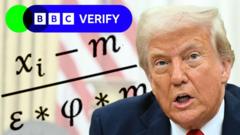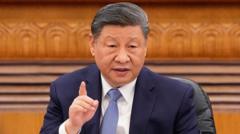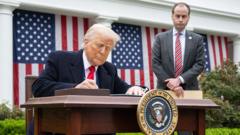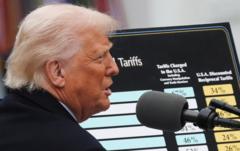### Summary: The recent announcement of significant tariffs by President Trump risks deepening divides with key trading partners such as the European Union and China, while instigating a new wave of protectionism.
### Title: Rising Tensions: Trump's Tariffs Ignite Global Trade Friction

### Title: Rising Tensions: Trump's Tariffs Ignite Global Trade Friction
### Description: President Trump's new tariffs create chasms between the U.S. and its allies, reshaping the global economic landscape.
---
In a significant escalation of trade tensions, President Trump has announced sweeping tariffs targeting numerous nations, resulting in a widening rift between the United States and its allies. The administration's latest plan, dubbed "reciprocal," proposes tariffs that would particularly affect major economies like the European Union, which is set to face a 20 percent levy, and China, which will incur an additional 34 percent on existing tariffs.
Eswar Prasad, a professor at Cornell University, remarked on the substantial nature of the tariffs, indicating that they align with the concerns expressed by advocates of free trade. He warned of the global repercussions of Trump's protectionist approach, emphasizing that this marks the onset of a new economic era.
While Mexico and Canada, two of America’s primary trading partners, are spared from additional levies beyond already-established tariffs on vehicles and metals, the new tariffs will introduce a baseline 10 percent duty on imports from other countries. This aggressive move is part of a broader trade war narrative that has been unfolding, following a series of earlier tariffs placed on steel and aluminum, as well as threats directed towards European products like alcohol.
As nations and markets respond to these developments, it remains to be seen how these tariffs will affect bilateral relationships and the overall stability of international trade.
In a significant escalation of trade tensions, President Trump has announced sweeping tariffs targeting numerous nations, resulting in a widening rift between the United States and its allies. The administration's latest plan, dubbed "reciprocal," proposes tariffs that would particularly affect major economies like the European Union, which is set to face a 20 percent levy, and China, which will incur an additional 34 percent on existing tariffs.
Eswar Prasad, a professor at Cornell University, remarked on the substantial nature of the tariffs, indicating that they align with the concerns expressed by advocates of free trade. He warned of the global repercussions of Trump's protectionist approach, emphasizing that this marks the onset of a new economic era.
While Mexico and Canada, two of America’s primary trading partners, are spared from additional levies beyond already-established tariffs on vehicles and metals, the new tariffs will introduce a baseline 10 percent duty on imports from other countries. This aggressive move is part of a broader trade war narrative that has been unfolding, following a series of earlier tariffs placed on steel and aluminum, as well as threats directed towards European products like alcohol.
As nations and markets respond to these developments, it remains to be seen how these tariffs will affect bilateral relationships and the overall stability of international trade.






















